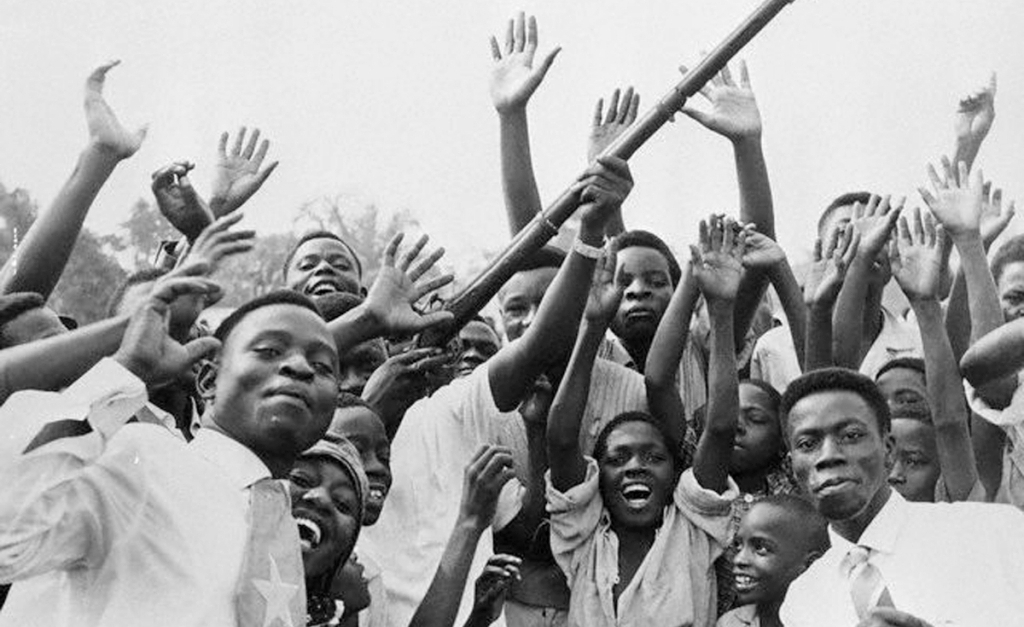End the Exploitation of Africa’s Human and Material Resources and Uphold the People’s Right to Be

People of the Republic of the Congo, celebrate independence, July 7, 1960 – one of 17 states in Africa to gain independence that year.
The peoples of Africa and of African descent have a proud history of celebrating African Liberation Day. On this day they mark the victories of their struggles against colonialism and for independence. They pledge to strengthen their unity in the struggle against all exploitation and for the complete liberation of the African continent. Today, at a time the COVID-19 pandemic is raging, TML Weekly condemns attempts of foreign powers to enslave Africa anew and commit new acts of genocide against the African peoples under the signboards of humanitarian aid and progress. It is important as never before to oppose the Eurocentric portrayal of Africa, her peoples, her history and their right to be and to condemn continued acts of genocide.
African Liberation Day was born out of the consciousness of the peoples of Africa that their liberation was their own act and part of the world-wide struggle against imperialism and of the united front of the working class and peoples to end the exploitation of persons by persons. It was initiated at the first Conference of Independent African States held in Accra, Ghana, on April 15, 1958, and attended by eight independent African heads of states.[1] That day was declared “Africa Freedom Day” to mark the onward progress of the liberation movement. In 1960, seventeen African states gained their sovereignty marking it as the “Year of Africa”. On May 25, 1963, the Organization of African Unity (OAU) was founded in Addis Ababa, Ethiopia, when more than 1,100 people representing 31 African states, 21 African liberation movements and hundreds of supporters and observers were in attendance.[2] The OAU proclaimed that May 25 would from then on be celebrated as “African Liberation Day” to be observed annually and to carry forward the aspirations of the peoples of Africa for freedom, sovereignty and a new society.

African heads of state at founding of the Organization of African Unity, May 25, 1963.
Today the African continent has 55 independent countries. With the exception of French-ruled Djibouti, no outside power directly holds sway over African territory. Despite this, the interference in African affairs of the former colonial powers and other big powers means that issues of African unity, independence and self-determination pose themselves as sharply as ever.
African Liberation Day 2020 comes at a time when the U.S. and British imperialists along with the former colonial powers such as France and Belgium and other countries such as Canada which intervenes to protect mining interests, are engaged in renewed attempts to reverse the tide of history and ruthlessly exploit the African continent for its vast human and material resources. It is an unimaginable crime on the part of these powers that their legacy and their present program of globalization have resulted in the African peoples being so impoverished, wracked by divisions and internecine conflict, while the resources on their territories are so bountiful. Britain would like to erase the memory of its inhuman colonial period when it took the lead in the slave trade and devastated whole peoples and cultures in acts of genocide. Meanwhile the role of the United States in the enslavement of Africans continues and demands for reparations are ringing out.
The world has rejected many of the Anglo-American and Eurocentric values and policies adopted in relation to attempts to subjugate Africa with the utter contempt they deserve but it continues to be the duty of the working class and people of Canada and the former colonial powers to break with and smash the chauvinist illusions promoted by the financial oligarchy and the monopolies that encourage the workers to join with them in taking up the new “white man’s burden,” by presenting the mission to make the monopolies successful in the global marketplace as being about “bringing development” to Africans. By taking up this duty we establish common cause with the peoples of Africa and the developing world who are struggling to advance on their own course of development and to secure and consolidate complete political and economic independence and to secure a future world which is fit for all human beings.
Hail African Liberation Day!
Notes
1. It was attended by representatives of the governments of Ethiopia, Ghana, Liberia, Libya, Morocco, Sudan, Tunisia, the United Arab Republic (which was the federation of Egypt and Syria) and representatives of the National Liberation Front of Algeria and the Union of Cameroonian Peoples. This conference was significant in that it represented the first Pan-African Conference held on African soil. It was also significant in that it represented the collective expression of African People’s disgust with the system of colonialism and imperialism, which brought so much suffering to African People. Further, it represented the collective will to see the system of colonialism permanently done away with. The Talking Drum states about this conference:
“After 500 years of the most brutal suffering known to humanity, the rape of Africa and the subsequent slave trade, which cost Africa in excess of 100,000,000 of her children, the masses of African People singularly, separately, individually, in small disconnected groupings for centuries had said, ‘enough’! But in 1958, at the Accra Conference, it was being said in ways that emphasized joint, coordinated and unified action.
“This conference gave sharp clarity and definition to Pan-Africanism, the total liberation and unification of Africa under scientific socialism. The conference as well laid the foundation and the strategy for the further intensification and coordination of the next stage of the African Revolution, for the liberation of the rest of Africa, and eventual and complete unification.”
2. By then more than two thirds of the continent had achieved independence from colonial rule.
(Source: http://www.thetalkingdrum.com. Photos Bettman, This Is Africa)
TML Weekly, May 30, 2020 – No. 19
